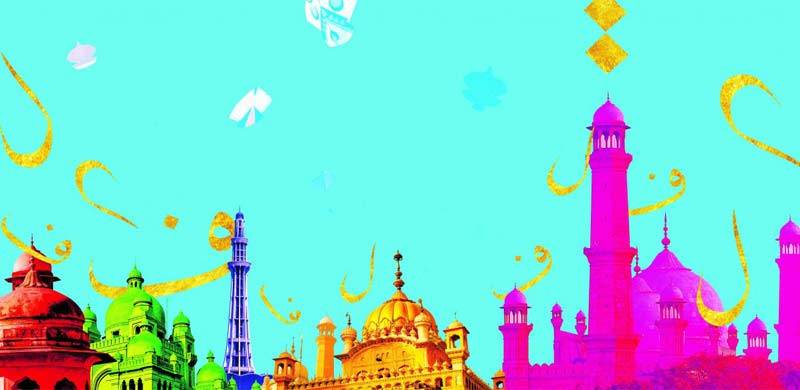
Last week on a crisp May morning, I reached Asia Society on upper east side in Manhattan anticipating a day full of stimulating discussions, intellectual buzz and freedom from the pressure to filter thought-provoking ideas and choosing words that are digestible generally. Familiar faces, acquaintances and friends were disbursed in the crowds in the corridors and auditorium. The New York audience – largely comprised of overseas Pakistanis and South Asians – had for the fourth time poured in on the auditorium for the Lahore Literary Festival, which illustrates their inclination for active engagement with the current political discourse in Pakistan and possibly finding the rare opportunity to collectively reminisce home.
Ironically (or maybe not), in a globalised digitalised modern world, the nuance on Pakistan’s issues, its people and aspirations is poignant and space for intellectual dialogue is shrinking.
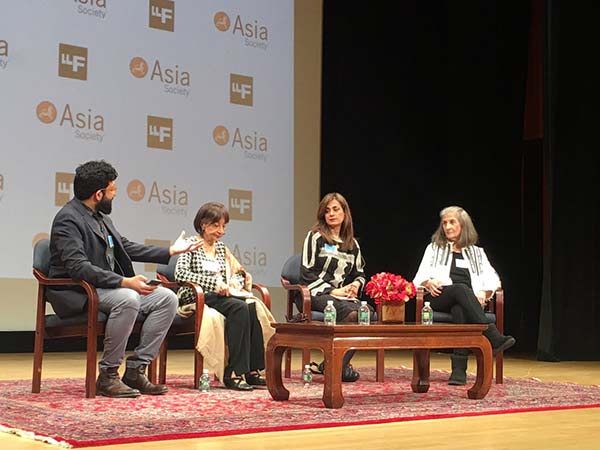
At the time when voices that form the fabric of a society; journalists, academics, writers, activists and political actors are being cornered and self-censorship has become the key to survival, the need for an open uninhibited intellectual debate on socio political issues is critical. LLF in Lahore and abroad have become one of the important spaces accessible to Pakistanis where they can celebrate difference of opinions, exchange of ideas and multidimensional perspectives that nurture and facilitate intellectual discourse.
The day kicked off with a dynamic group of artists and authors – Salima Hashmi, Khaled Ahmed, Iftikhar Dadi and Raza Rumi – paying tribute to Lahore’s perennial and wild romance with literature, art and politics. The session epitomised how the city lives to tell the tale of its glorious literary past, memories of which linger across eras of history.
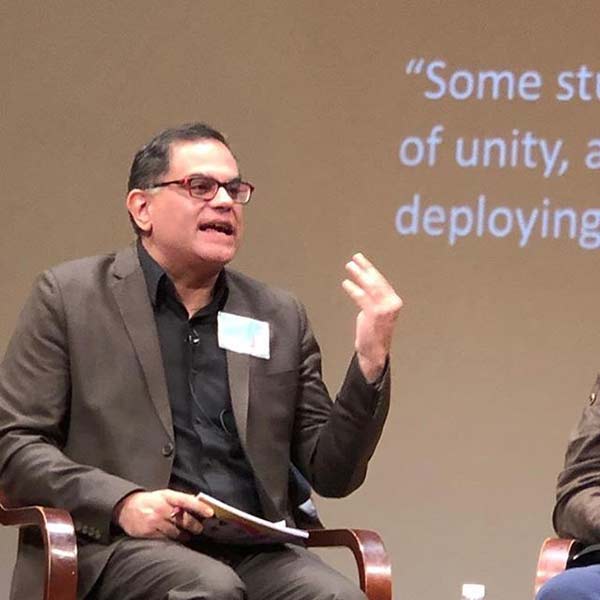
Madhur Jaffrey, Sameen Rushdie, Summayya Usmani and Ahmed Ali Akbar’s pulled an unexpectedly diverse and beaming crowd to a lively celebration of culinary diversity of South Asia. The subcontinent’s cuisine being a huge amalgamation of elaborate as well as comfort, recipes that have travelled down generations and spread out to continents, is the modern version of dynastic, regional and rural cuisines. Fusing and evolving as distances between continents shrank, it now has a distinct place on the spectrum of universal cuisines.
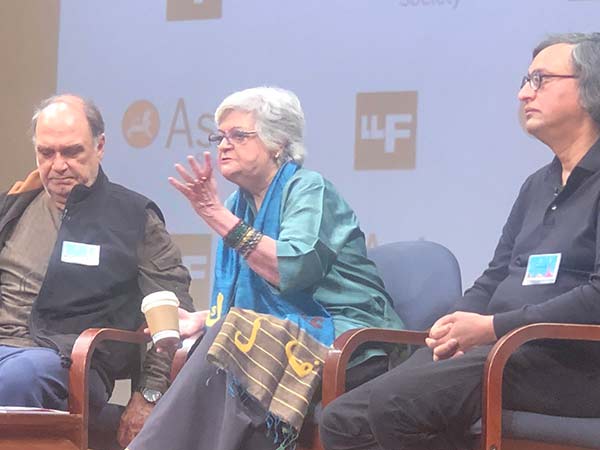
Leading diplomats and authors including Richard G. Olson, Shuja Nawaz, Madiha Afzal and Jennifer Griffin had the undivided attention of the audience while they analysed US-Pakistan’s topsy turvy relationship and continuing challenges in a candid fashion unearthing conflicts, highs and lows vis-a-vis various turning points in history.
A discussion between Sarvat Hasin, Taymour Soomro, Zarrar Said and Osama Siddique introduced us to a fresh band of bold voices from the subcontinent, gave us insight on the politics of writing and the role of the audience. Nerina Rustomji and Nur Sobers-Khan explored the after-life in Islamic gardens through religious and historic scriptures. Aban Marker Kabraji, Erum Sattar, Marc-Andre Franche and Issam Ahmed spun the discussion on Pakistan’s growing economy’s impact on its Environment, a subject that has been grossly neglected in the past.
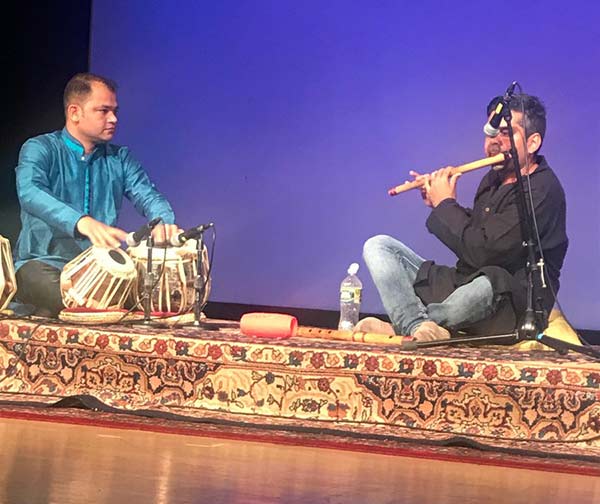
‘There are a lot of books that I don’t like but it never occurs to me to kill the author’ remarked Wendy Donigar as she, Ayesha Jalal and Manan Ahmed explored growing levels of bigotry and intolerance towards dissent and free speech in South Asia. Ayesha Jalal makes several arguments including on post-colonial modernity in South Asia, which has come with a homogenisation of rights and resistance towards dissent.
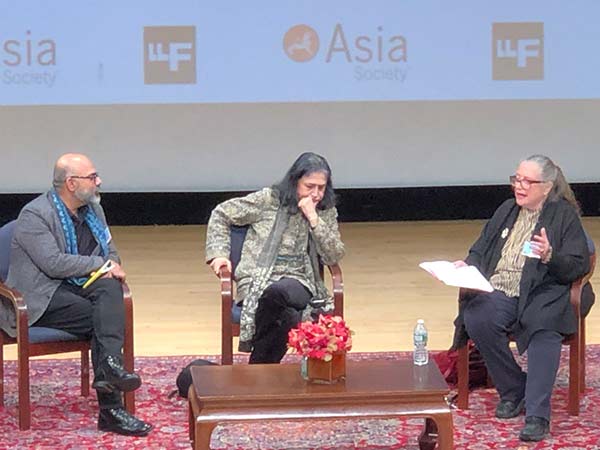
Language is both identity and politics. As the LLF was closing, one wondered that if every city’s literary festival is a snippet of the city’s culture and vibe then why Lahore’s must remain silent on the city’s soul, Punjabi. What one truly misses in almost every cultural or literature festival in Lahore is a discussion in and on the language of the people; Punjabi.
LLF evening echoed true Pakistani tradition and sounds of gaiety; Haider Rehman played a beautiful flute rendition, which was followed by the towering orator and actor, Zia Mohiyeeden’s impeccable presentation of poetry and his own comic writing, which had the audience in stitches.
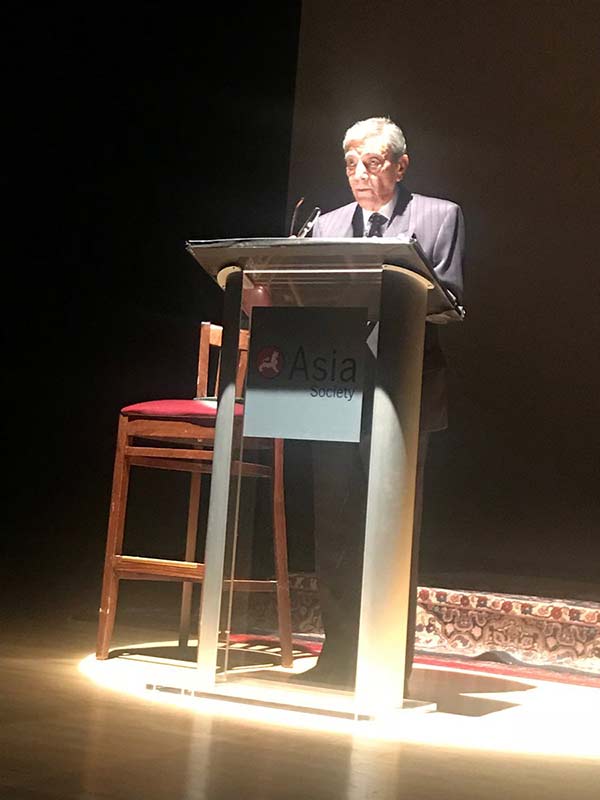
The day long Lahore literary festival in New York was a magnificent amalgamation of stories from Pakistan – especially Lahore – that left the audience wondering in awe; of kingdoms and Rajs, of partition and violence, of gods and shrines, of music and art, of class and power, of ideas and creativity, of frugality and hunger, of food and hospitality, of mango trees and canals, of language and literature, of politics and resistance, of betrayal and loyalty and of poets and thinkers.
LLF in New York was virtually Lahore in a capsule; its rich romantic legacy of art and culture, its identity and crises, diverse set of complexities and myriad voices springing from every corner of the city, representing both brutality and warmth.
Ironically (or maybe not), in a globalised digitalised modern world, the nuance on Pakistan’s issues, its people and aspirations is poignant and space for intellectual dialogue is shrinking.

At the time when voices that form the fabric of a society; journalists, academics, writers, activists and political actors are being cornered and self-censorship has become the key to survival, the need for an open uninhibited intellectual debate on socio political issues is critical. LLF in Lahore and abroad have become one of the important spaces accessible to Pakistanis where they can celebrate difference of opinions, exchange of ideas and multidimensional perspectives that nurture and facilitate intellectual discourse.
The day kicked off with a dynamic group of artists and authors – Salima Hashmi, Khaled Ahmed, Iftikhar Dadi and Raza Rumi – paying tribute to Lahore’s perennial and wild romance with literature, art and politics. The session epitomised how the city lives to tell the tale of its glorious literary past, memories of which linger across eras of history.

Madhur Jaffrey, Sameen Rushdie, Summayya Usmani and Ahmed Ali Akbar’s pulled an unexpectedly diverse and beaming crowd to a lively celebration of culinary diversity of South Asia. The subcontinent’s cuisine being a huge amalgamation of elaborate as well as comfort, recipes that have travelled down generations and spread out to continents, is the modern version of dynastic, regional and rural cuisines. Fusing and evolving as distances between continents shrank, it now has a distinct place on the spectrum of universal cuisines.

Leading diplomats and authors including Richard G. Olson, Shuja Nawaz, Madiha Afzal and Jennifer Griffin had the undivided attention of the audience while they analysed US-Pakistan’s topsy turvy relationship and continuing challenges in a candid fashion unearthing conflicts, highs and lows vis-a-vis various turning points in history.
A discussion between Sarvat Hasin, Taymour Soomro, Zarrar Said and Osama Siddique introduced us to a fresh band of bold voices from the subcontinent, gave us insight on the politics of writing and the role of the audience. Nerina Rustomji and Nur Sobers-Khan explored the after-life in Islamic gardens through religious and historic scriptures. Aban Marker Kabraji, Erum Sattar, Marc-Andre Franche and Issam Ahmed spun the discussion on Pakistan’s growing economy’s impact on its Environment, a subject that has been grossly neglected in the past.

‘There are a lot of books that I don’t like but it never occurs to me to kill the author’ remarked Wendy Donigar as she, Ayesha Jalal and Manan Ahmed explored growing levels of bigotry and intolerance towards dissent and free speech in South Asia. Ayesha Jalal makes several arguments including on post-colonial modernity in South Asia, which has come with a homogenisation of rights and resistance towards dissent.

Language is both identity and politics. As the LLF was closing, one wondered that if every city’s literary festival is a snippet of the city’s culture and vibe then why Lahore’s must remain silent on the city’s soul, Punjabi. What one truly misses in almost every cultural or literature festival in Lahore is a discussion in and on the language of the people; Punjabi.
LLF evening echoed true Pakistani tradition and sounds of gaiety; Haider Rehman played a beautiful flute rendition, which was followed by the towering orator and actor, Zia Mohiyeeden’s impeccable presentation of poetry and his own comic writing, which had the audience in stitches.

The day long Lahore literary festival in New York was a magnificent amalgamation of stories from Pakistan – especially Lahore – that left the audience wondering in awe; of kingdoms and Rajs, of partition and violence, of gods and shrines, of music and art, of class and power, of ideas and creativity, of frugality and hunger, of food and hospitality, of mango trees and canals, of language and literature, of politics and resistance, of betrayal and loyalty and of poets and thinkers.
LLF in New York was virtually Lahore in a capsule; its rich romantic legacy of art and culture, its identity and crises, diverse set of complexities and myriad voices springing from every corner of the city, representing both brutality and warmth.
